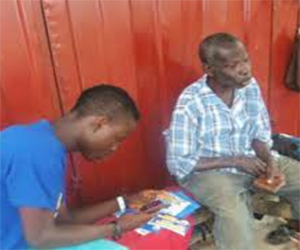The Department for International Development (DFID) of the United Kingdom has awarded Johns Hopkins Bloomberg School of Public Health Center for Communication Programs (CCP) £5,500,000 (approximately $8 million) to scale up an electronic coupon (e-coupon) strategy for continuous distribution of long lasting insecticidal nets (LLINs) in Ghana. The two-and-a-half-year scale-up called the e-Enhanced Social Marketing Initiative (ESMI) will be led by CCP, in partnership with Mennonite Economic Development Associates (MEDA) and Malaria Consortium.
The goal of ESMI is to establish a long-term capacity for Ghanaian households to affordably access LLINs to prevent malaria in their families and communities. ESMI will leverage an e-coupon scheme using mobile phone technology to provide various levels of subsidies to consumers through the private sector to develop a market for LLINs in Ghana. The project also includes a marketing communication component to stimulate demand of LLINs.
The scale up will target the general population in six southern regions of Ghana as well as in collaboration with at least 10 large employers based within those regions. A third target population is corporate-adopted communities by some of the participating workplaces.
The process to receive and redeem an e-coupon involves an exchange of text messages with a mobile phone technology system, designed and managed by MEDA. This system was adapted from a similar one implemented in Tanzania and performed well during the pilot. e-Coupon redemption for a subsidized net will take place at any of the numerous participating retailers conveniently located throughout the towns in all six regions.
To contribute to the establishment of a competitive market for LLINs, ESMI will invite and work closely with interested net manufacturers to feed the supply chain. By collaborating with multiple manufacturers, a variety of nets may be offered and consumers will have the choice of buying the brand and shape they want.
Demand creation for nets and a willingness to pay will be crucial to the success of the market since Ghanaians have in recent years been exposed to distributions of free nets through mass campaigns. In order to shift people’s attitudes and expectations around mechanisms for obtaining a new net, marketing communication will be used to demonstrate the value and benefits of using a net to prevent malaria, promote getting a good night’s sleep and other non-health benefits, as well as educate the target audiences on the e-coupon scheme.
The ESMI design is based on a USAID-funded pilot led by CCP’s NetWorks project and implemented in partnership with MEDA and Malaria Consortium. The pilot launched in October 2013 and ended in mid-February 2014. A process evaluation was conducted in November to document the pilot’s strengths and weaknesses. Results from the evaluation along with final data from the pilot and overall lessons learned will continue to inform the ESMI work, which is expected to launch in mid-2014.




